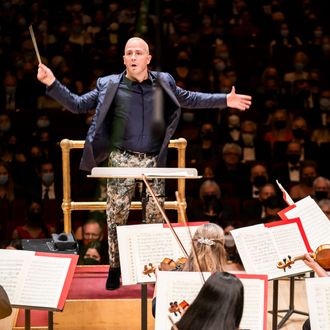
It takes a lot of gnashing, heartbreak, and frustration to get there, but Beethoven’s Fifth Symphony ends in prolonged spasms of joy. In many performances, that ending is almost an afterthought, the obligatory oompah payoff to the hike through vales of emotional, suspenseful shadows. But when Yannick Nézet-Séguin led the Philadelphia Orchestra in the first music to ring from the Carnegie Hall stage after 572 days of silence, the celebratory coda was the point. The ensemble, undimmed from all that idleness, gave off sparks of glee and the audience gratefully caught them. In an ordinary year, nothing could be more ordinary than this program’s confluence of brand names. But those notes were the last that the Philadelphians played (to an empty house) in March 2020 before the extended intermission; 18 months later, they heralded a new start. Tears, yells, and standing ovations were probably a foregone conclusion, but the performers earned them anyway.
Wednesday’s gala concert featured a passel of beginnings, and Beethoven’s da-da-da-DUH was only the last of them. Before that came Iman Habibi’s “Jeder Baum Spricht (Every Tree Speaks),” a meditative gloss on Beethoven as nature lover attuned to the music of forests. Habibi connects the early 19th century’s understanding of wilderness as a vessel of human emotions to the 21st century’s view of the environment as a victim of human violence. Musically, though, he seems bound in a kind of preindustrial sonic imagery: The mood shifts with the clouds, skies lower orchestrally, trees tremolo, and glades sing. Then, suddenly, without pause … da-da-da-DUH.
The overture to Habibi’s introduction to Beethoven was from Candide, and you could hardly ask for a more committed performance of Bernstein’s romp through tenderness and manic optimism. Before that, the pianist Yuja Wang dashed and dodged through Shostakovich’s Second Piano Concerto with her utterly reliable flair. And the lead-in to all those starts was Valerie Coleman’s brief but memorable “Seven O’Clock Shout,” which the Philadelphia Orchestra commissioned during the pandemic’s first spring and gave a quarantine-friendly online premiere. It’s a touching distillation of that impromptu ritual of thanks, a kind of sequel to Copland’s “Fanfare for the Common Man.”
Thankfulness was the program’s main ingredient: gratitude that musicians and audiences could come together again, that at least the thickest columns of cultural life still stand, and that those big, rich, analog noises could once again bloom indoors, pushing against wood and plaster and reaching all those hungry ears.





